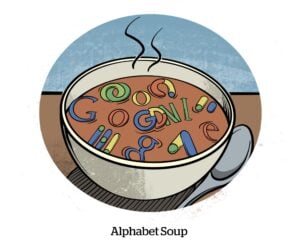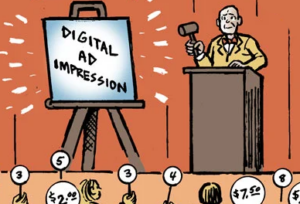Here’s today’s AdExchanger.com news round-up… Want it by email? Sign up here.
The Markets Of Marketing
Antitrust trials are, naturally, preoccupied with the details of how business categories are defined.
Google and the DOJ are currently questioning witnesses regarding how particular ad channels are established as defined markets.
Google wants the judge to view media more as one large pool of supply, with social media, programmatic display and sometimes even video or CTV ads as part of one competitive market. In that way, Google can point to Comcast, Meta, The Trade Desk, Walmart, Samsung, etc., as huge, growing, viable rivals.
The DOJ is focused narrowly on the “open display advertising market,” where it says it tied three of its products together: the ad server to its exchange, with the ad network exclusively available through its exchange.
In 2021, an FTC antitrust suit against Facebook was dismissed and had to be refiled with new market definitions, because the FTC had invented a category – “Personal Social Networking Services” – which encompassed Facebook and Snapchat, but not TikTok, Reddit, Pinterest, Twitter and other logical platforms.
The DOJ’s unsuccessful suit to block AT&T’s acquisition of Time Warner also hinged on AT&T’s position that it competed in a broad “video marketplace,” rather than the DOJ’s allegation that it maintained a monopoly in the “multichannel video programming distributor” market.
The New Network To Get Work
A wave of freelance advertising consultants in programmatic and ecommerce advertising has come, and may now be receding. Rather than matriculating into larger consultancy practices, the trend of one-person consulting businesses shows how individuals with bespoke talent maneuver the brave new world of hybrid work.
Just yesterday, former Reuters CRO Eric Danetz announced a new job as president at Cognitiv, a custom bidding startup. Danetz was previously working freelance consulting projects, as AdExchanger profiled this year. He did say that he was open to the right full-time role, since he preferred being part of a company to a temporary “cog.”
Jana Meron, another digital news vet, likewise started a solo consultancy in 2022. She joined The Washington Post as VP of revenue operations and data this year.
On the brand side, also, a cottage industry of consultants has popped up – and been quickly snapped up, too. For instance, Marjorie Chelius, former VP of marketing at the stroller brand Mockingbird, started a consultancy for marketing and attribution strategy. She was hired by Google to lead retail data partnerships for Nest and Fitbit products.
Deal With It
California legislators opted for a sweetheart deal with Google rather than attempting to pass two proposed bills that would have required revenue sharing with news publishers. As part of the deal, Google will contribute $110 million over the next five years to support news orgs based in the state.
It was a surprising turn, considering California emerged as a Big Tech antagonist with its data privacy laws setting the high bar in the US. But there were fundamental differences between California and other jurisdictions, like Canada, that have passed revenue-sharing laws, The Lever reports.
Canadian Prime Minister Justin Trudeau advocated for the new law, whereas California Governor Gavin Newsom, a Silicon Valley tech ally, did not. Google has also spent $2 million since 2023 lobbying the California legislature and Newsom’s office.
But there were other points working against California’s revenue-sharing proposals. For one, only relatively large publishers would receive funding, which smaller publishers saw as a giveaway to VC-backed media companies like Gannett or local news companies that have been rolled up and exploited by hedge funds.
Hopes that California would be the savior of US journalism now seem misplaced. But maybe Illinois will fare better.
But Wait, There’s More!
Amazon is quietly bringing ads to Rufus, its generative AI shopping tool. [Adweek]
Three things to know about corporate DEI rollbacks. [Financial Times]
Apple must pay billions in back taxes to Ireland, a warning to US Big Tech. [Wired]
Why some US sports teams are launching their own streaming services. [The Current]
Philanthropists and media leaders raise $15 million to support local news in Los Angeles. [Axios]















